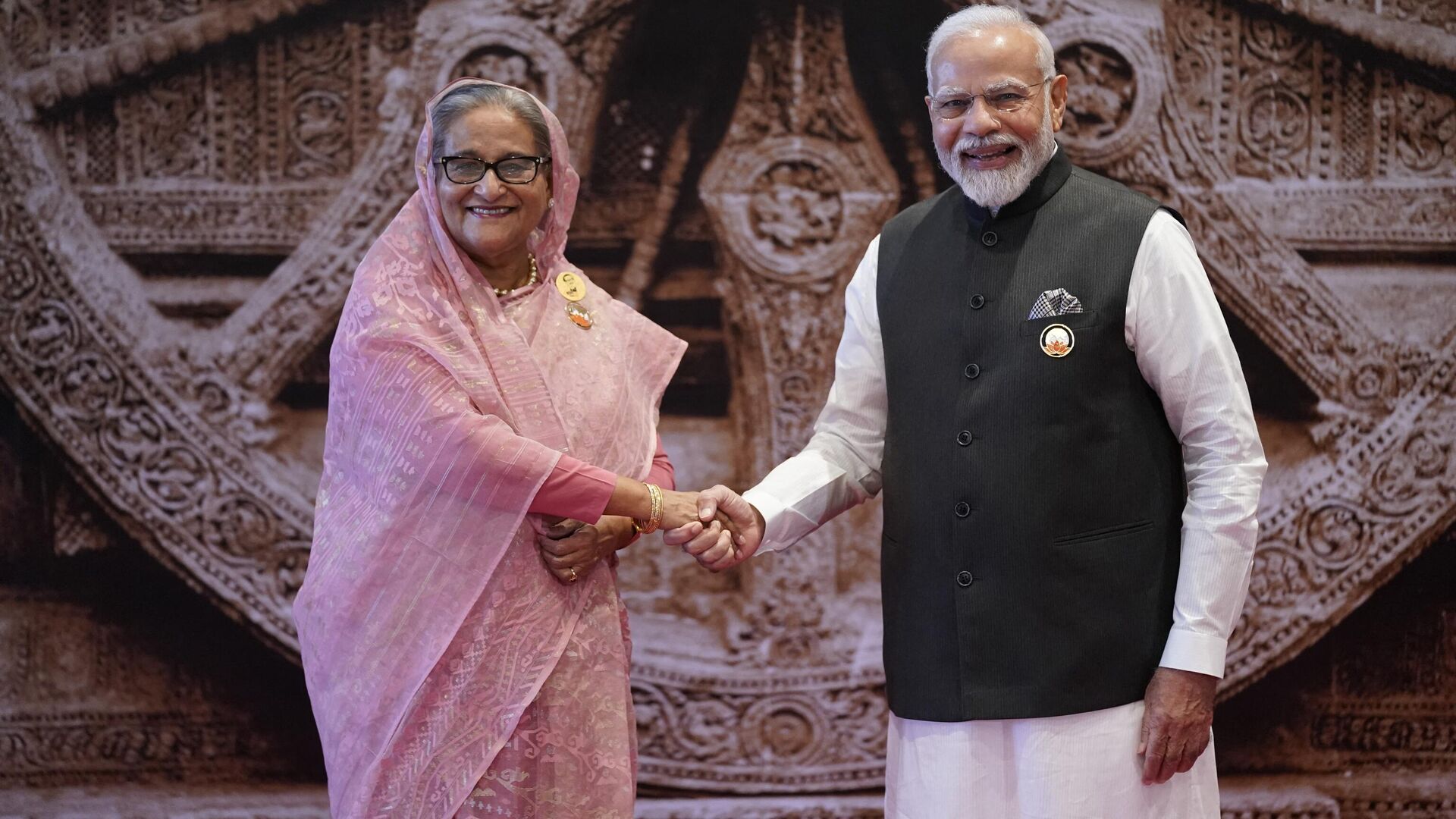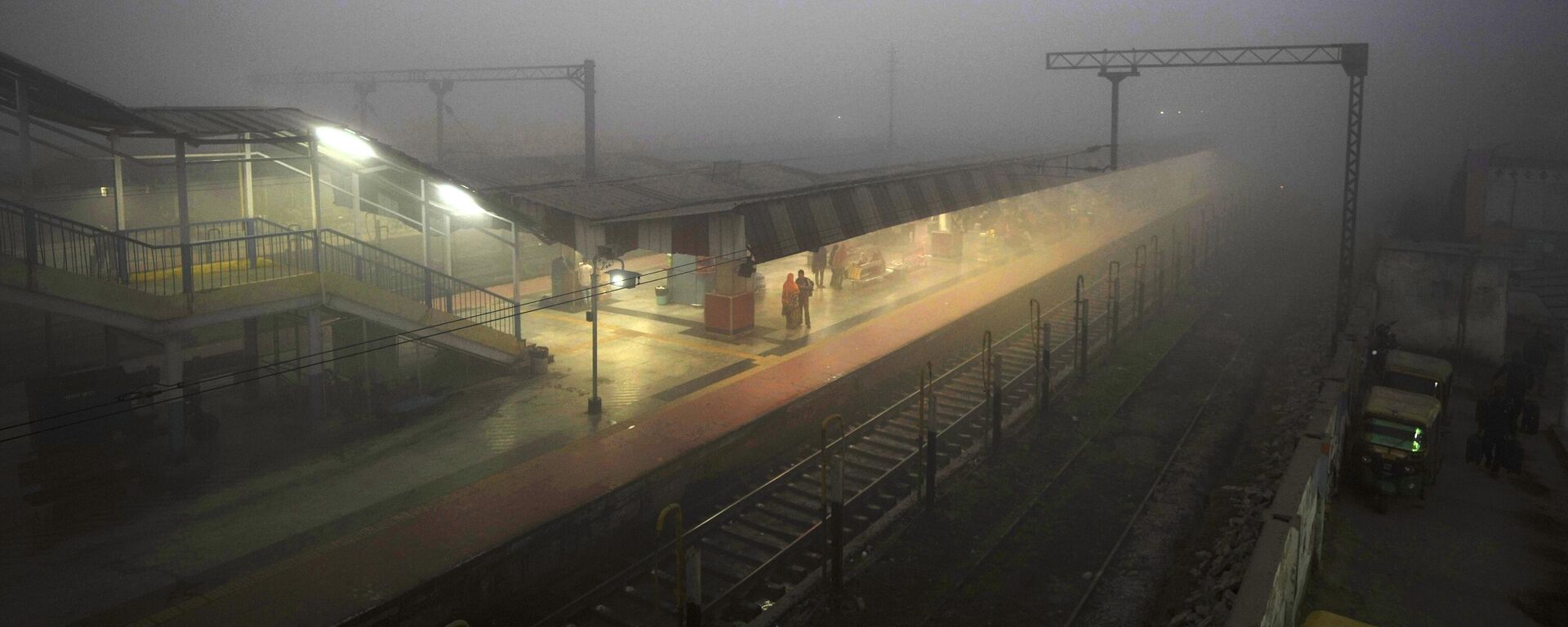https://sputniknews.in/20240620/hasinas-visit-bangladesh-seeks-to-reassure-india-amid-growing-ties-with-china-7667098.html
Hasina's Visit: Bangladesh Seeks to Reassure India Amid Stronger Ties With China
Hasina's Visit: Bangladesh Seeks to Reassure India Amid Stronger Ties With China
Sputnik India
Bangladesh's PM Sheikh Hasina will pay a two-day visit to New Delhi starting Friday, India's Ministry of External Affairs (MEA) said on Thursday.
2024-06-20T19:32+0530
2024-06-20T19:32+0530
2024-06-20T21:46+0530
sputnik opinion
sheikh hasina
narendra modi
xi jinping
bangladesh
india
dhaka
ministry of external affairs (mea)
belt and road initiative (bri)
regional connectivity
https://cdn1.img.sputniknews.in/img/07e7/0b/10/5439061_0:160:3072:1888_1920x0_80_0_0_a04557cd006ad423f7ec0d3b364a8787.jpg
The upcoming visit of Prime Minister Sheikh Hasina to India will "reinforce" New Delhi's status as Bangladesh's closest political, economic and security partner, according to Iqbal Sobhan Chowdhury, a former advisor to the leader of the government.Significantly, Chowdhury underscored that Hasina's visit, her second to New Delhi in less than a month, takes place ahead of her planned visit to Beijing next month. The dates for Hasina's China arrival are yet to be announced, but the nation's Ambassador to Dhaka Yao Wen told the media that the PM's trip would be a "gamechanger" for bilateral ties.While New Delhi, which militarily helped its neighbour in 1971 Liberation war, has ranked as Dhaka's closest partner, Beijing's economic significance has been rising since President Xi Jinping's visit to Bangladesh in 2016. At present, China ranks as its biggest trading partner.Bangladesh has signed on the Belt and Road Initiative (BRI), relying on infrastructure investments from Beijing. Last year, the country unveiled its first submarine base – BNS Sheikh Hasina – built with Chinese technical assistance in Cox's Bazar along the Bay of Bengal.The growing economic and defence ties between Bangladesh and China are being watched carefully in New Delhi, which has consistently maintained that it "monitors" all the developments which have a bearing on its national security in the South Asia and Indian Ocean Region (IOR).At the same time, Chowdhury explained Bangladesh's diplomatic dilemma.Meanwhile, Bangladesh has intensified its cross-border connectivity links with India in recent years to show its "commitment" to ties with New Delhi even as the Hasina government courts Beijing, Chowdhury.For India's part, since 2014, PM Modi has made strengthening overall bilateral ties, which include trade and investment, energy, power, defence, transport and development linkages, with Bangladesh as a foreign policy priority under the 'Neighbourhood First Policy'. In 2022, both the countries kicked off formal negotiations for a free trade agreement (FTA). In 2015, the two governments signed the border pact negotiated over 40 years ago, an event described by Hasina as a “huge diplomatic success”. Both the nations closely cooperate in the seven-country regional integration mechanism called the Bay of Bengal Initiative for Multi-Sectoral Technical and Economic Cooperation (BIMSTEC). Teesta River Management Project: Focus of Hasina-Modi TalksChowdhury highlighted that the Teesta River Comprehensive Management and Restoration Project (TRCMRP) would be one of the main focal areas of negotiations between Hasina and Modi.On the other hand, Mohammad Azaz, the head of Dhaka-based consultancy River and Delta Research Centre (RDRC), underscored during a conversation with Sputnik India that the Teesta River is the primary source of livelihood for the farming communities residing along the Bangladesh-India border. Originating in the Himalayas in the Indian state of Sikkim, the river passes through West Bengal and enters Bangladesh.The water sharing of the cross-border Teesta River has long been a bone of contention between Bangladesh and India. During Hasina's previous bilateral visit to India in 2022, she called on India to sign the Teesta River water-sharing agreement, which has been hanging fire since 2011.In 2016, in the course Xi's official visit to Dhaka, China agreed to assist Bangladesh in river management, including reclamation of land.Azaz noted that state-backed Bangladesh Water Development Board and China's Power Construction Corporation signed a MoU for a feasibility study on the Teesta River, the report for which was approved in 2019.Hasina informed the parliament this month that her government had requested Beijing to fund the $6.9 billion project on "easier terms", a response to which was awaited.Meanwhile, Indian Foreign Secretary Vinay Kwatra offered Indian assistance for the Teesta River development during a visit to Dhaka on 8-9 May.After Kwatra's visit, Bangladesh's Foreign Minister Hasan Mahmud told local media that the financing of the Teesta project would have to be in accordance with the state's needs.River expert Azaz, in turn, said that the Teesta River project had become a very critical one for Dhaka.
https://sputniknews.in/20231101/whats-the-significance-of-3-new-projects-in-bangladesh-built-with-indias-help-5180410.html
bangladesh
india
dhaka
assam
meghalaya
manipur
tripura
the himalayas
bay of bengal
indian ocean
river ganga
south asia
Sputnik India
feedback.hindi@sputniknews.com
+74956456601
MIA „Rossiya Segodnya“
2024
Dhairya Maheshwari
https://cdn1.img.sputniknews.in/img/07e6/0c/13/138962_0:0:641:640_100x100_80_0_0_2cb44360dbcdf6d84bf4b299cd045917.jpg
Dhairya Maheshwari
https://cdn1.img.sputniknews.in/img/07e6/0c/13/138962_0:0:641:640_100x100_80_0_0_2cb44360dbcdf6d84bf4b299cd045917.jpg
News
en_IN
Sputnik India
feedback.hindi@sputniknews.com
+74956456601
MIA „Rossiya Segodnya“
Sputnik India
feedback.hindi@sputniknews.com
+74956456601
MIA „Rossiya Segodnya“
Dhairya Maheshwari
https://cdn1.img.sputniknews.in/img/07e6/0c/13/138962_0:0:641:640_100x100_80_0_0_2cb44360dbcdf6d84bf4b299cd045917.jpg
hasina india visit, bangladesh pm india visit, hasina state visit, teesta water sharing project, teesta water treaty, bangladesh india news, bangladesh india trade, teesta river comprehensive management and restoration project (trcmrp), chinese naval base bangladesh, china bangladesh trade, china bangladesh news, hasina china visit, modi swearing in
hasina india visit, bangladesh pm india visit, hasina state visit, teesta water sharing project, teesta water treaty, bangladesh india news, bangladesh india trade, teesta river comprehensive management and restoration project (trcmrp), chinese naval base bangladesh, china bangladesh trade, china bangladesh news, hasina china visit, modi swearing in
Hasina's Visit: Bangladesh Seeks to Reassure India Amid Stronger Ties With China
19:32 20.06.2024 (Updated: 21:46 20.06.2024) Bangladesh's PM Sheikh Hasina will pay a two-day visit to New Delhi starting Friday, India's Ministry of External Affairs (MEA) said on Thursday. This will be the first incoming bilateral state visit to India after Modi was sworn-in as PM for a third term.
The upcoming visit of Prime Minister Sheikh Hasina to India will "reinforce" New Delhi's status as Bangladesh's closest political, economic and security partner, according to Iqbal Sobhan Chowdhury, a former advisor to the leader of the government.
"During the summit talks with Prime Minister Narendra Modi in New Delhi, one could expect both the leaders to cover all the major issues in bilateral relations. From Bangladesh's side, the Teesta River water sharing treaty, cross border connectivity, the security situation in Myanmar as well as economic and trade issues among others will top the agenda," the ex-PM aide told Sputnik India.
Significantly, Chowdhury underscored that Hasina's visit, her second to New Delhi in less than a month, takes place ahead of her planned visit to Beijing next month.
The dates for Hasina's China arrival are yet to be announced, but the nation's Ambassador to Dhaka Yao Wen told the media that the PM's trip would be a "gamechanger" for bilateral ties.
While New Delhi, which militarily helped its neighbour in 1971 Liberation war, has ranked as Dhaka's closest partner, Beijing's economic significance has been rising since President Xi Jinping's visit to Bangladesh in 2016. At present, China ranks as its biggest trading partner.
Bangladesh has signed on the
Belt and Road Initiative (BRI), relying on infrastructure investments from Beijing. Last year, the country
unveiled its first submarine base – BNS Sheikh Hasina – built with Chinese technical assistance in Cox's Bazar along the Bay of Bengal.
The growing economic and defence ties between Bangladesh and China are being watched carefully in New Delhi, which has consistently maintained that it "monitors" all the developments which have a bearing on its national security in the South Asia and Indian Ocean Region (IOR).
At the same time, Chowdhury explained Bangladesh's diplomatic dilemma.
"India and Bangladesh have
historical bonds dating back to the 1971 War. We will be eternally grateful to India. Bangladesh wouldn't take any step which would comprise India's national security interests. But, at the same time, we are a developing country. We need investments to graduate to the status of a developed nation by 2041. China has got the funding and it is now an important development partner for us," the former PM advisor remarked.
Meanwhile, Bangladesh has intensified its cross-border connectivity links with India in recent years to show its "commitment" to ties with New Delhi even as the Hasina government courts Beijing, Chowdhury.
"India's landlocked northeastern region has been a big beneficiary as a result of greater road and rail links between the two countries, as noted by External Affairs Minister (EAM) S. Jaishankar. The seven Indian states now have access to sea through Bangladesh," he said.
For India's part, since 2014, PM Modi has made strengthening overall bilateral ties, which include trade and investment, energy, power, defence, transport and development linkages, with Bangladesh as a foreign policy priority under the 'Neighbourhood First Policy'.
In 2022, both the countries kicked off formal negotiations for a free trade agreement (FTA). In 2015, the two governments signed the border pact negotiated over 40 years ago, an event described by Hasina as a “huge diplomatic success”.
Both the nations closely cooperate in the seven-country regional integration mechanism called the Bay of Bengal Initiative for Multi-Sectoral Technical and Economic Cooperation (BIMSTEC).
Teesta River Management Project: Focus of Hasina-Modi Talks
Chowdhury highlighted that the Teesta River Comprehensive Management and Restoration Project (TRCMRP) would be one of the main focal areas of negotiations between Hasina and Modi.
On the other hand, Mohammad Azaz, the head of Dhaka-based consultancy River and Delta Research Centre (RDRC), underscored during a conversation with Sputnik India that the Teesta River is the primary source of livelihood for the farming communities residing along the Bangladesh-India border. Originating in the Himalayas in the Indian state of Sikkim, the river passes through West Bengal and enters Bangladesh.
"For years, Bangladesh has accused India of diverting the Teesta water through building barrages in the upstream. The flow of the river is significantly weakened once it enters Bangladesh, which necessitates the signing of the water-sharing treaty. But there has been a lack of political will to finalise the treaty," Azaz explained.
The water sharing of the cross-border Teesta River has long been a bone of contention between Bangladesh and India. During Hasina's previous bilateral visit to India in 2022, she called on India to sign the Teesta River water-sharing agreement, which has been hanging fire since 2011.
In 2016, in the course Xi's official visit to Dhaka, China agreed to assist Bangladesh in river management, including reclamation of land.
Azaz noted that state-backed Bangladesh Water Development Board and China's Power Construction Corporation signed a MoU for a feasibility study on the Teesta River, the report for which was approved in 2019.
Both nations have tentatively agreed to "reclaim" over 170 square kilometers of land and develop an economic zone comprising industries, power plants and settlements among others, he added.
Hasina informed the parliament this month that her government had requested Beijing to fund the $6.9 billion project on "easier terms", a response to which was awaited.
Meanwhile, Indian Foreign Secretary Vinay Kwatra
offered Indian assistance for the Teesta River development during a visit to Dhaka on 8-9 May.
After Kwatra's visit, Bangladesh's Foreign Minister Hasan Mahmud told local media that the financing of the Teesta project would have to be in accordance with the state's needs.
River expert Azaz, in turn, said that the Teesta River project had become a very critical one for Dhaka.
"The priority for Bangladesh is get a fair share of its water resources. We are looking to develop and seek investments in the basin. China has offered to develop the basin, but if India could give us a better deal, then I'm sure that Bangladesh would consider that prospect favourably," Azaz concluded.



